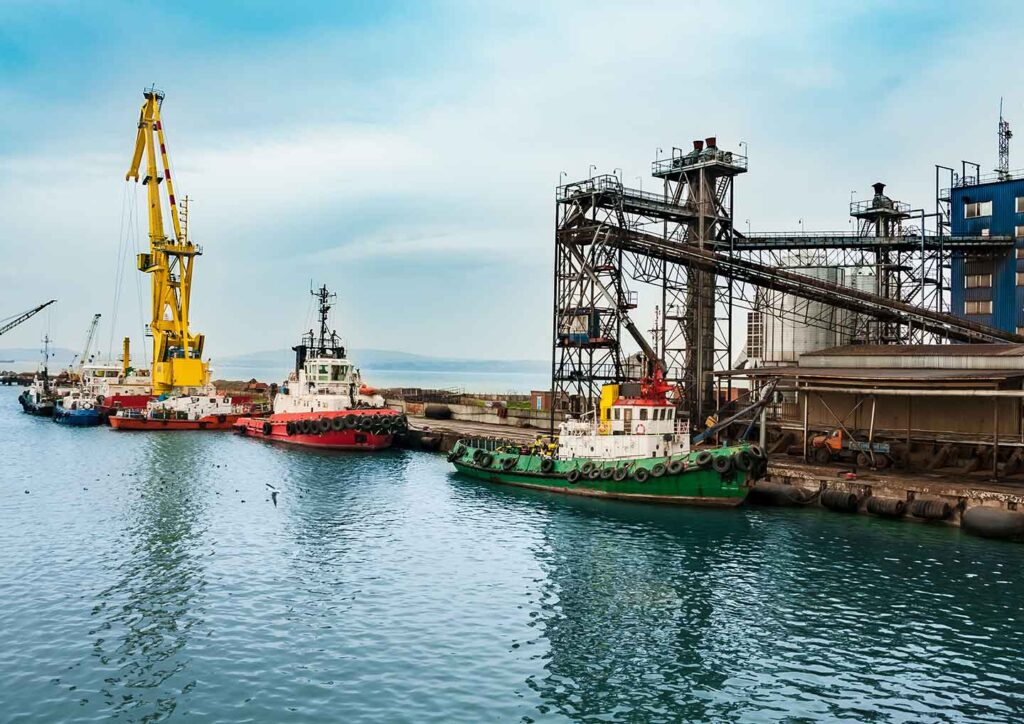- INTRODUCTION
Globalization and the varying human and capital resources have greatly emphasized International trade as a great driver of economic growth and development and it is not hyperbolic to state that no country can survive without international trade. Nigeria is ranked as one of the African countries with the largest market for goods and services. It is estimated that over US$ 500 million worth of goods and services are produced in Nigeria. Hence, the impact of domestic and international trade on the Nigerian economy cannot be undermined. No doubt, here is a great connection between international trade and economic growth and development.
Economic growth is measured by the Gross Domestic Product in Nigeria. GDP1 is the total monetary or market value of all the finished goods and services produced within a country in a specific period. It functions as a comprehensive measurement of the country’s economic health2. Nigeria has a GDP estimate of $410 million out of which the oil and gas sector accounts for 80 percent of this figure.3
This article seeks to examine the operation of trade and businesses in Nigeria vis a vis the regulatory framework.
- CONCEPT OF A FREE TRADE ZONE
Free trade is an economic policy that allows countries to import and export goods without any tariff barriers. It is derived from the concept of free market idea in international trade. By producing goods the country has a comparative advantage, free trade allows for an increase in the export of goods and services of the producing country which in turn advance the economic growth of such country.
A Free Trade Zone or Foreign Trade Zone4 is a special geographical area where goods and services are manufactured, imported, and re-exported under certain regulations and generally not subject to customs duty. Free Trade zones are usually situated around areas with geographic advantages for trade. The rationale for exempting businesses that operate in the free trade zone is to boost foreign direct investment, increase employment rate in the regions the FTZs are located and overall generate income for the country. Nigeria has two Free Trade Zones: the general and specialized free trade zones. The Oil and Gas Export Free Zone is the only specialized zone regulated by the Oil and Gas Free Zones Authority. The Nigeria Export Processing Zones Authority regulates the general free trade zones in Nigeria.
- OPERATION OF FREE TRADE ZONES IN UAE
There are over thirty free zones operating in Dubai. A Free Zone Authority offers business licenses to foreign-owned businesses. Each free Zone is designed around one or more industry and only offers Licenses (for a Free Zone Enterprise (FZE), to Companies within those categories. The Free Zones in the UAE region have greatly improved the economic growth of the country as these free zones offer services in the trading, tourism, and industrial sectors. The Dubai Multi Commodities Centre is home to over 7,000 registered companies and actively employs over 1.2 million citizens. Also, the Dubai International Financial Centre contributes 35 percent to the rate of the Foreign Direct Investment of the country’s economy. The Jebel Ali Free Zone under the management and supervision of the Jebel Ali Free Zone Authority contributes about 42% to the Foreign Direct Investment of the Company.
- The Nigeria Export Processing Zones Authority
Is the regulatory body for the management of all Export Processing Zones in Nigeria. The body is responsible for promoting and facilitating local and international investments in Nigeria into licensed Export Processing Zones. Since its establishment, NEPZA has promulgated investment procedures, operational guidelines, and regulations for Export Processing Zones in Nigeria. The regulatory body has also encouraged private and public sector involvement in the operation and development of Export processing Zones. It is important to mention that trade activities permissible in the Export Processing Zones include:
- Manufacturing of goods for export,
- Warehousing, Freight forwarding and Customs Clearance
- Handling of duty-free goods, Banking, stock exchange and other financial services
- Insurance and re-insurance.
- International Commercial arbitration services.
- REGULATORY FRAMEWORK ON FREE TRADE AND COMPETITION IN NIGERIA
The outbreak of the novel Covid-19 pandemic has affected the eventual signing and commencement of the African Continental Free Trade Agreement (“AfCFTA or the Agreement”). It is in this vein that African Head of States have scheduled to consider January 1, 2021 as the new implementation date for the Agreement.5. Nigeria in the bid to create jobs and diversify her economy and increase foreign exchange has introduced several policies focused on empowering manufacturers in country and for the exploration of the various economic opportunities in the Nigerian market.
- Approval of Foreign Investments and Protection to business trade in Nigeria
The need for a centralized and coherent investment promotional effort in Nigeria led to the establishment of the Nigeria Investment Promotional Commission (“the Commission”) under the NIPC Act its functions include but not limited to coordination, administration of investments and provision of advice to the Federal Government (FG) on the general development of the Nigerian economy6. Section 19 and 20 of the NIPC Act mandates foreign investors intending to establish a business enterprise in Nigeria to incorporate or register the entity under the provisions of the Companies and Allied Matters Act (CAMA). While the NIPC Act does not set out the criteria a proposed foreign investment must satisfy before admission into Nigeria, it however ensures that an admitted foreign investor must be capable of meeting the developmental goals of Nigeria. Also, the Presidential Enabling Business Environment Council (PEBEC) was established to provide an action plan on the removal of all difficulties affecting the ease of doing business in Nigeria.
- Protection against Expropriation and Nationalization
Section 25 of the NIPC Act protects foreign investors and local investors from the risks of expropriation and nationalization. The law further states that in any event where the FGN expropriate or nationalize the asset of a foreign investor, such affected investor is entitled to compensation without any delay from the Federal Government of Nigeria. In addition, the Act 7 allows for easy repatriation in convertible currency of compensation. This clearly reveals the aim of the act which is to provide a great measure of assurance for investors.
- Protection against Currency Risk
The ability to repatriate convertible currency to meet obligations ranks top among several factors a foreign investor considers in reach a decision on the country to invest. .8 By implication, it is guaranteed under the NIPC Act that the Nigerian government will not with the instrumentality of the law or any administrative Act prevent the transfer of proceeds of an investor’s investments.9 While the section is silent as to the computation of time relating convertibility of fund out of the host state, the computation of a reasonable time is considered under the Multilateral Investment Guarantee Agency Convention (MIGA) which places an obligation on contracting parties to act within a reasonable time after the receipt of the investor’s application for a transfer10.
- Effective Dispute Resolution
The medium of settling investment disputes under an investment code or treaty is as important as the protection of trade and investment in a country. Section 26 of the NIPC Act is instructive with regards to the mode of settlement of investment disputes in Nigeria. It states:
(1) Where a dispute arises between an investor and any Government of the Federation in respect of an enterprise, all efforts shall be made through mutual discussion to reach an amicable settlement.
(2) Any dispute between an investor and any Government of the Federation in respect of an enterprise to which this Act applies which is not amicably settled through mutual discussions, may be submitted at the option of the aggrieved party to arbitration as follows;
(a) In the case of a Nigerian investor, in accordance with the rules of procedure for arbitration as specified in the Arbitration and Conciliation Act; or
(b) In the case of a foreign investor, within the framework of any bilateral or multilateral agreement on investment protection to which the Federal Government and the country of which the investor is a national are parties; or
(c) In accordance with any other national or international machinery for the settlement of investment disputes agreed on by the parties.
(3) Where in respect of any dispute, there is disagreement between the investor and the Federal Government as to the method of dispute settlement to be adopted, the International Centre for Settlement of Investment Disputes Rules shall apply.
In view of the above, a framework on how disputes which arise out of trade agreements or FDI will be resolved will instill a level of confidence in the Nigerian market wherein an investor can settle any trade or commercial transaction related disputes In line with international best practices.
- INVESTMENT OPPORTUNITIES FOR MSMES IN NIGERIA UNDER THE AfCFTA
Nigeria is Africa’s largest market and a gateway to the African business hub with an increasing population of over 200 million, a consumer market of almost $500bn yearly, and a middle class of circa 29 million people. The commencement of AfCFTA is forecasted to boost intra-Africa trade through the creation of a single market of over 1.2 billion people and a cumulative GDP of over $3.4 trillion. Therefore, the impact of AfCFTA on MSMEs largely depends on the preparedness of various sectors of the economy.11 AfCFTA, arguably the largest free trade agreement in the world is set to remove over ninety percent of tariffs on goods traded among member States. The agreement amongst other things allows a free flow of movement within the continent, thereby enabling the creation of a single market economy.
- How does MSMEs benefit from AfCFTA?
The focal point of the AfCFTA is the promise of a zero tariff for over ninety percent on goods traded between African States. The effect of this is that manufacturers or producers can increase their production rate as their goods can now be sold locally and generally to a larger African market. The removal of trade duties helps to reduce the production cost of several goods hence making them competitive across all markets. 12
Creation of New Market
One of the major challenges faced by MSME operators in Nigeria is their inability to compete with foreign counterparts. This AfCFTA seeks to solve this challenge as Nigerian manufacturers will be able to export and explore the opportunities available within the markets in Africa to sell their goods. We believe that this will allow for a fair competition.
Attraction of foreign investments
The commencement of AfCFTA breaths a fresh air to the several factors that affect foreign investment in Nigeria. The agreement will allow investors to set up their manufacturing factories close to where raw materials are accessible and allow the importation of foreign currency by foreign investors.
Creation of Jobs
The commencement of AfCFTA will allow for easy movement across the borders of member States. By implication, it is projected that the increase in trade activities will require business hubs across board to seek the employments of talents from various parts of the continent and solidify its staff strength. This will in turn increase the creation of jobs and lower the unemployment rate in the signatory countries.
Increase Export activities
The commencement of AfCFTA seeks to ensure an increment in the export activities of primary producers in countries where raw materials are available in large quantities. The finance, logistics, real estate sectors are expected to witness a major boost in their business due to the increase in the demand of these services.
- Overview of Trade Competition in Nigeria
The Federal Competition and Consumer Protection Act regulate competition in the Nigerian trade sector. There are however specific sector legislations. The FCCPA establishes the Federal Competition and Consumer Commission and the FCCPT. The responsibilities of the FCCPC13 AND FCCPT14 include:
- Adequate market regulation
- Protection of businesses
- Ensure the access of all citizens to safe products
- Secure the protection of rights for all consumers in Nigeria
- Promote fair and efficient competitive markets in the Nigerian economy.
It is believed that the FCCPA would help promote economic competitiveness in the country and strengthen the framework for encouraging and supporting small and medium scale businesses. The law seeks to give a breather of hope to consumer of various goods and services from unjust trade practices in the Nigerian sphere.
Application
The FCCPA applies to a body or corporate agency of the Federal Government or a body corporate or agency of a subdivision of the Federation, if such body corporate or agency engages in commercial activities, Federal, State and Local Government Agencies of Nigeria that engages in commercial activities and all commercial entities aimed at making profit and geared towards the satisfaction of demand from the public. The Commission also has the power to conduct investigations either on its own accord or at the request of any person or body corporate into a sector of the economy or into a particular type of agreement across various sectors especially where it appears that there are grounds for believing that a monopoly situation may exist in relations to the production, distribution or export of goods and services.
- Competition in the Nigerian Oil and Gas Sector
Nigeria is the tenth largest oil producer in the world and the third largest in Africa. Its economy is largely dependent upon its oil sector as it accounts for ninety-five percent of Nigeria’s foreign exchange earnings. A large percentage of the oil produced in Nigeria is produced through joint venture, hence the presence of International Oil Companies. The upstream and downstream sectors form a major viable component of the oil sector as it contributes over ninety percent of the exports of the country. The Nigerian Oil and Gas Industry Content Development Act (Local Content Act) is one of the principal legislations that regulate the exploration, distribution and marketing of oil and gas in Nigeria. The Act applies to all operations in the Nigerian oil and gas industry including Exploration and Production/Service Companies.
The Act seeks to promote indigenous participation in the oil and gas industry as Nigerian independent operators shall be given exclusive consideration in the award of oil blocks, oil field licences and in all projects for which contract is to be awarded in the oil and gas industry15. The Act establishes the Nigerian Content Development Monitoring Board; the Board is saddled with the responsibility of ensuring the continuous growth of Nigerian content in all oil and gas transactions and projects in the Nigerian Oil and Gas Industry. 16
To a large extent, competition in the Nigerian Oil and Gas sector is regulated by the Local Content Act and the Federal Competition and Consumer Protection Act as well as other sector specific laws. While the Local Content Act seeks to promote indigenous participation in the oil and gas sector, in reality we see that the
sector is majorly dominated by foreigners and multinational companies as they possess the monetary and technical resources in exploring our major resource.
- Conclusion
Stakeholders have expressed their fears on the implementation of AfCFTA such as loss of job and the probability of dumping goods in the economies of member States. While these fears are quite genuine, they do not override the numerous benefits of the agreements. In addition, Trade Liberalization has over the years not proven counter-intuitive especially where there is an established regulatory framework. Additionally, the commencement of the agreement will create jobs as many industries will expand businesses in other member States. While the agreement is set to commence at a future date, Governments of member States should lend their support in ensuring the implementation of AfCFTA by taking proactive steps in ensuring that the economic space in their country allows the AfCFTA thrive.
Footnotes
1. Gross Domestic Product
2. Investopedia.
<3. Data by Country economy.com
4. As referred in other jurisdictions.
5. https://iclg.com/alb/10078-nigeria-embraces-a-free-trade-future accessed on the 2/5/2020
6. https://uk.practicallaw.thomsonreuters.com/w0164262?transitionType=Default&contextData=(sc.Default)&firstPage=true&bhcp=1
7. Section 3 of the Nigeria Investment Protection Commission Act
8. Section 24 of the Nigeria Investment Protection Commission Act.
9. Section 24 of the NIPC Act and 15 of the Foreign Exchange Monitoring & Miscellaneous Provision Act (FEMMPA)
10. https://connectnigeria.com/articles/2019/12/how-the-afcfta-will-impact-small-businesses-in-nigeria/amp/ accessed on the 3/5/2020.
11. https://punchng.com/regulatory-framework-for-foreign-investment-in-nigeria/ accessed on the 4/5/2020.
12. https://nairametrics.com/2019/07/08/how-afcfta-affects-your-business-benefits-and-disadvantages/ accessed on the 4/5/2020
13. Federal Competition and Consumer Commission
14. Federal Competition and Consumer Tribunal
15. Section 3(1) of the Local Content Act
16. Section 5 of the Local Content Act.
The content of this article is intended to provide a general guide to the subject matter. Specialist advice should be sought about your specific circumstances.




